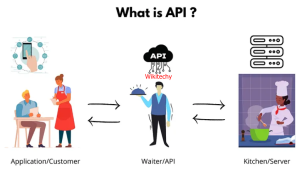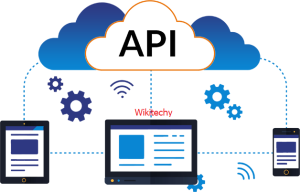Application Programming Interface is a software interface that allows two applications to interact with each other without any user intervention. API is a collection of software functions and procedures. In simple terms, API means a software code that can be accessed or executed. Application Programming Interface is defined as a code that helps two different software’s to communicate and exchange data with each other. It offers products or services to communicate with other products and services without having to know how they’re implemented.
How does API work ?
To understand the functionality of the API, let see the following example:
Let’s say you went out to a restaurant for dinner. You receive a menu card from the server, which you may customize by writing down your preferences, such as ordering a vegetarian sandwich. The waiter will deliver your order after a while. But there is a process involved, so it is not as easy as it first appears. The waiter is crucial in this situation because you won’t go to the kitchen to get your order or tell the chef what you want; instead, the waiter will handle all of this. Similar to a waiter, an API receives your request, processes it, and then responds by telling the system what you want.

Let us take some technical examples. For instance, you visit the movie website, type in your name, movie, and credit card details, and yeah! You print your tickets. They are working together with other apps. The reason this connection is referred to as “seamless” is that you are unaware of the transfer of a software role between applications.

Why would we need an API?
Application Programming Interface acronym API helps two different software’s to communicate and exchange data with each other.
- It helps you to embed content from any site or application more efficiently.
- APIs can access app components.
- The delivery of services and information is more flexible.
- Content generated can be published automatically.
- It allows the user or a company to customize the content and services which they use the most.
- Software needs to change over time, and APIs help to anticipate changes.
Types of API

Open APIs:
- These types of APIs are publicly available to use like OAuth APIs from Google. It has also not given any restriction to use them. So, they are also known as Public APIs.
Partner APIs:
- Specific rights or licenses to access this type of API because they are not available to the public.
Internal APIs:
- Internal or private. These APIs are developed by companies to use in their internal systems. It helps you to enhance the productivity of your teams.
Composite APIs:
- This type of API combines different data and service APIs.
Communication level of APIs
Here, are some communication levels of APIS:
High-Level APIs:
- High-level APIs are those that we can generally use in REST form, where programmers have a high level of abstraction. These APIs mostly concerned about performing a limited functionality.
Low-Level APIs:
- This kind of APIs has a lower level of abstraction, which means they are more detailed. It allows the programmer to manipulate functions within an application module or hardware at a granular level.
What are Web APIs?
A Web API is an application programming interface which is use either for web server or a web browser.
Two types of Web APIs are
- Server-side API
- Client-side API
1) Server-side
Server-side web API is a programmatic interface that consist of one or more publicly exposed endpoints to a defined request–response message system. It is typically expressed in JSON or XML .
2) Client-side
A client-side web API is a programmatic interface helps to extend functionality within a web browser or other HTTP client.
Examples of web API
Google Maps APIs :
- It allow developers to embed Google Maps on webpages by using a JavaScript or Flash interface.
YouTube API :
- It allows developers to integrate YouTube videos and functionality into websites or applications.
Twitter offers two APIs.
REST API :
- It helps developers to access Twitter data, and the
Search API :
- It provides methods for developers to interact with Twitter Search.
Amazon’s API :
- It gives developers access to Amazon’s product selection.


